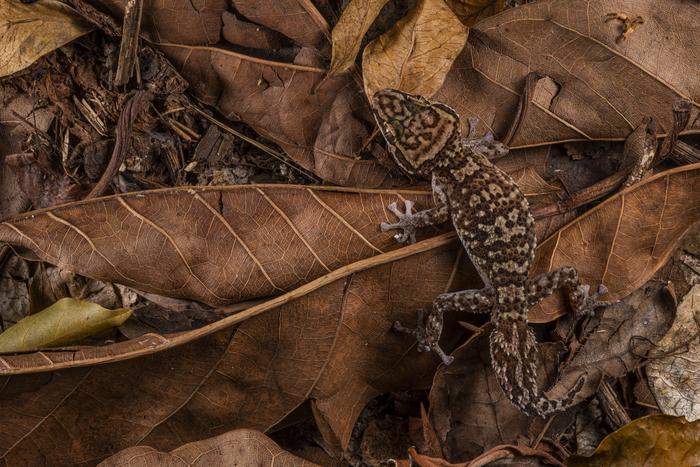Named after its habitat preference, Paroedura manongavato, from the Malagasy words “manonga” (to climb) and “vato” (rock), is a bouldering expert. Part of its “home range” is also very well-known to rock climbers for its massive granitic domes. “Its description represents another step into the crux (in climbing jargon, the most difficult section of a bouldering problem) of resolving the taxonomy of the recently revised P. bastardi group, where the new species belongs, and reaching a total of 25 described species in this genus, all exclusively living in Madagascar and Comoros,” says C. Piccoli from CIBIO – Research Center in Biodiversity and Genetic Resources, Portugal. She and her team just published a paper describing the new gecko.

Credit: Javier Lobón-Rovira
Named after its habitat preference, Paroedura manongavato, from the Malagasy words “manonga” (to climb) and “vato” (rock), is a bouldering expert. Part of its “home range” is also very well-known to rock climbers for its massive granitic domes. “Its description represents another step into the crux (in climbing jargon, the most difficult section of a bouldering problem) of resolving the taxonomy of the recently revised P. bastardi group, where the new species belongs, and reaching a total of 25 described species in this genus, all exclusively living in Madagascar and Comoros,” says C. Piccoli from CIBIO – Research Center in Biodiversity and Genetic Resources, Portugal. She and her team just published a paper describing the new gecko.
Thus far, this species has only been found in Anja Reserve and Tsaranoro, both of which are isolated forest patches in the arid south-central plateau of Madagascar. These sites, at a distance of ca. 25 km, have a peculiar conformation, with huge granitic boulders close to rocky cliffs and surrounded by vegetation. The survival of P. manongavato, defined as microendemic for being restricted to a very narrow distributional range, thus depends on the preservation of these small forest patches. Subsequently, the authors proposed an evaluation of its conservation status as Critically Endangered, a category designated for species threatened of extinction by the International Union for Conservation of Nature.
Its discovery history is long, starting during the Malagasy summer of 2010, when the first evidence of another Paroedura species was found in Anja, together with the recently described P. rennerae in 2021. Distinguishing these two species on the field is a difficult task. Both species have prominent dorsal-enlarged keeled scales and a similar dorsal pattern, although adults of P. manongavato have an overall less spiky appearance, less contrasted dorsal markings, and a smaller body size compared to P. rennerae. The need to collect more samples brought researchers A. Crottini, F. Andreone, and G. M. Rosa to return to Anja in 2014, and collect the future holotype (i.e. the name-bearing and description reference individual) of this new species. Later in 2018, F. Belluardo, J. Lobón-Rovira, and M. Rasoazanany, visited Anja and Tsaranoro again and were able to collect several tissue samples and high-resolution photos of the reptiles living in the area, including the new gecko species. This cumulative data collection was fundamental to advance with its description.
Published in the open access journal ZooKeys, this study highlights the importance of conducting herpetological inventories in Madagascar to improve our understanding of species diversity and progress with species conservation assessments. “The description of this species shows the importance of collaborative efforts when documenting biodiversity, especially for those range-restricted and isolated species at greatest risk of disappearing,” points out the leading author of this study C. Piccoli.
Original source
Piccoli C, Belluardo F, Lobón-Rovira J, Oliveira Alves I, Rasoazanany M, Andreone F, Rosa GM, Crottini A (2023) Another step through the crux: a new microendemic rock-dwelling Paroedura (Squamata, Gekkonidae) from south-central Madagascar. ZooKeys 1181: 125-154. https://doi.org/10.3897/zookeys.1181.108134
Funding information
Fieldwork was funded by National Geographic Society (grant number EC–50656R–18 to FB) and by Portuguese National Funds through Fundação para a Ciência e a Tecnologia (FCT) (grant number PTDC/BIA-EVL/31254/2017 to AC).
Portuguese National Funds through FCT supported the research contract to AC (2020.00823.CEECIND/CP1601/CT0003) and the PhD studentships through the Biodiversity, Genetics & Evolution Doctoral Programme (BIODIV) of CP (SFRH/BD/144342/2019), FB (PD/BD/128493/2017), and JLR (PD/BD/140808/2018). JLR is currently supported by Fundação BIOPOLIS (contract BIOPOLIS 2022-18), co-funded by the project NORTE-01-0246-FEDER-000063 supported by Norte Portugal Regional Operational Programme (NORTE2020), under the PORTUGAL 2020 Partnership Agreement, through the European Regional Development Fund (ERDF).
Journal
ZooKeys
DOI
10.3897/zookeys.1181.108134
Article Title
Another step through the crux: a new microendemic rock-dwelling Paroedura (Squamata, Gekkonidae) from south-central Madagascar
Article Publication Date
4-Oct-2023




